Yusimry
Generic name: adalimumab-aqvh (subcutaneous route)
Drug class: TNF alfa inhibitors
Medically reviewed by A Ras MD. Last updated on june 03,2022.
What is Yusimry?
Yusimry is a medicine called a Tumor Necrosis Factor (TNF) blocker. Yusimry is used:
- To reduce the signs and symptoms of:
- moderate to severe rheumatoid arthritis (RA) in adults. Yusimry can be used alone, with methotrexate, or with certain other medicines.
- moderate to severe polyarticular juvenile idiopathic arthritis (JIA) in children 2 years and older. Yusimry can be used alone or with methotrexate.
- psoriatic arthritis (PsA) in adults. Yusimry can be used alone or with certain other medicines.
- ankylosing spondylitis (AS) in adults.
- To treat moderate to severe Crohn’s disease (CD) in adults and children 6 years of age and older.
- To treat moderate to severe ulcerative colitis (UC) in adults. It is not known if adalimumab products are effective in people who stopped responding to or could not tolerate TNF-blocker medicines.
- To treat moderate to severe chronic (lasting a long time) plaque psoriasis (Ps) in adults who have the condition in many areas of their body and who may benefit from taking injections or pills (systemic therapy) or phototherapy (treatment using ultraviolet light alone or with pills).
What is the most important information I should know about Yusimry?
Yusimry is a medicine that affects your immune system. Yusimry can lower the ability of your immune system to fight infections. Serious infections have happened in people taking adalimumab products. These serious infections include tuberculosis (TB) and infections caused by viruses, fungi or bacteria that have spread throughout the body. Some people have died from these infections.
- Your healthcare provider should test you for TB before starting Yusimry.
- Your healthcare provider should check you closely for signs and symptoms of TB during treatment with Yusimry.
You should not start taking Yusimry if you have any kind of infection unless your healthcare provider says it is okay.
Before starting Yusimry, tell your healthcare provider if you:
- think you have an infection or have symptoms of an infection such as:
- fever, sweats, or chills
- warm, red, or painful skin or sores on
- muscle aches your body
- cough
- burning when you urinate or urinate
- shortness of breath more often than normal
- blood in phlegm
- feel very tired
- diarrhea or stomach pain
- weight loss
- are being treated for an infection.
- get a lot of infections or have infections that keep coming back.
- have diabetes.
- have TB, or have been in close contact with someone with TB.
- were born in, lived in, or traveled to countries where there is more risk for getting TB. Ask your healthcare provider if you are not sure.
- live or have lived in certain parts of the country (such as the Ohio and Mississippi River valleys) where there is an increased risk for getting certain kinds of fungal infections (histoplasmosis, coccidioidomycosis, or blastomycosis). These infections may happen or become more severe if you use Yusimry. Ask your healthcare provider if you do not know if you have lived in an area where these infections are common.
- have or have had hepatitis B.
- use the medicine Orencia (abatacept), Kineret (anakinra), Rituxan (rituximab), Imuran(azathioprine), or Purinethol (6–mercaptopurine, 6-MP).
- are scheduled to have major surgery.
After starting Yusimry, call your healthcare provider right away if you have an infection, or any sign of an infection. Yusimry can make you more likely to get infections or make any infection that you may have worse.
Cancer
- For children and adults taking Tumor Necrosis Factor (TNF)-blockers, including Yusimry, the chances of getting cancer may increase.
- There have been cases of unusual cancers in children, teenagers, and young adults using TNF-blockers.
- People with rheumatoid arthritis (RA), especially more serious RA, may have a higher chance for getting a kind of cancer called lymphoma.
- If you use TNF blockers, including Yusimry, your chance of getting two types of skin cancer may increase (basal cell cancer and squamous cell cancer of the skin). These types of cancer are generally not life-threatening if treated. Tell your healthcare provider if you have a bump or open sore that does not heal.
- Some people receiving TNF blockers including Yusimry developed a rare type of cancer called hepatosplenic T-cell lymphoma. This type of cancer often results in death. Most of these people were male teenagers or young men. Also, most people were being treated for Crohn’s disease or ulcerative colitis with another medicine called Imuran (azathioprine) or Purinethol (6–mercaptopurine, 6–MP).
What should I tell my healthcare provider before taking Yusimry?
Yusimry may not be right for you. Before starting Yusimry, tell your healthcare provider about all of your medical conditions, including if you:
- have an infection. See “What is the most important information I should know about Yusimry?”
- have or have had cancer.
- have any numbness or tingling or have a disease that affects your nervous system such as multiple sclerosis or Guillain-Barré syndrome.
- have or had heart failure.
- have recently received or are scheduled to receive a vaccine. You may receive vaccines, except for live vaccines while using Yusimry. Children should be brought up to date with all vaccines before starting Yusimry.
- are allergic to Yusimry or to any of its ingredients. See the end of this Medication Guide for a list of ingredients in Yusimry.
- are pregnant or plan to become pregnant, breastfeeding or plan to breastfeed. You and your healthcare provider should decide if you should take Yusimry while you are pregnant or breastfeeding.
- have a baby and you were using Yusimry during your pregnancy.
Tell your baby’s healthcare provider before your baby receives any vaccines. Tell your healthcare provider about all the medicines you take, including prescription and over-the-counter medicines, vitamins, and herbal supplements.
Especially tell your healthcare provider if you use:
- Orencia (abatacept), Kineret (anakinra), Remicade (infliximab), Enbrel (etanercept), Cimzia (certolizumab pegol) or Simponi (golimumab), because you should not use Yusimry while you are also using one of these medicines.
- Rituxan (rituximab). Your healthcare provider may not want to give you Yusimry if you have received Rituxan (rituximab) recently.
- Imuran (azathioprine) or Purinethol (6–mercaptopurine, 6-MP).
Keep a list of your medicines with you to show your healthcare provider and pharmacist each time you get a new medicine.
How should I take Yusimry?
- Yusimry is given by an injection under the skin. Your healthcare provider will tell you how often to take an injection of Yusimry. This is based on your condition to be treated. Do not inject Yusimry more often than you were prescribed.
- See the Instructions for Use inside the carton for complete instructions for the right way to prepare and inject Yusimry.
- Make sure you have been shown how to inject Yusimry before you do it yourself. You can call your healthcare provider or 1-800-483-3692 if you have any questions about giving yourself an injection. Someone you know can also help you with your injection after they have been shown how to prepare and inject Yusimry.
- Do not try to inject Yusimry yourself until you have been shown the right way to give the injections. If your healthcare provider decides that you or a caregiver may be able to give your injections of Yusimry at home, you should receive training on the right way to prepare and inject Yusimry.
- Do not miss any doses of Yusimry unless your healthcare provider says it is okay. If you forget to take Yusimry, inject a dose as soon as you remember. Then, take your next dose at your regular scheduled time. This will put you back on schedule. In case you are not surewhen to inject Yusimry, call your healthcare provider or pharmacist.
- If you take more Yusimry than you were told to take, call your healthcare provider.
What are the possible side effects of Yusimry?
Yusimry can cause serious side effects, including: See “What is the most important information I should know about Yusimry?”
- Serious Infections.
Your healthcare provider will examine you for TB and perform a test to see if you have TB. If your healthcare provider feels that you are at risk for TB, you may be treated with medicine for TB before you begin treatment with Yusimry and during treatment with Yusimry. Even if your TB test is negative your healthcare provider should carefully monitor you for TB infections while you are taking Yusimry. People who had a negative TB skin test before receiving adalimumab products have developed active TB. Tell your healthcare provider if you have any of the following symptoms while taking or after taking Yusimry:- cough that does not go away
- weight loss
- low grade fever
- loss of body fat and muscle (wasting)
- Hepatitis B infection in people who carry the virus in their blood.
If you are a carrier of the hepatitis B virus (a virus that affects the liver), the virus can become active while you use Yusimry. Your healthcare provider should do blood tests before you start treatment, while you are using Yusimry, and for several months after you stop treatment with Yusimry.
Tell your healthcare provider if you have any of the following symptoms of a possible hepatitis B infection:- muscle aches
- clay-colored bowel movements
- feel very tired
- fever
- dark urine
- chills
- skin or eyes look yellow
- stomach discomfort
- little or no appetite
- skin rash
- vomiting
- Allergic reactions. Allergic reactions can happen in people who use Yusimry. Call your healthcare provider or get medical help right away if you have any of these symptoms of a serious allergic reaction:
- hives
- swelling of your face, eyes, lips, or mouth
- trouble breathing
- Nervous system problems. Signs and symptoms of a nervous system problem include: numbness or tingling, problems with your vision, weakness in your arms or legs, and dizziness.
- Blood problems. Your body may not make enough of the blood cells that help fight infections or help to stop bleeding. Symptoms include a fever that does not go away, bruising or bleeding very easily, or looking very pale.
- New heart failure or worsening of heart failure you already have. Call your healthcare provider right away if you get new worsening symptoms of heart failure while taking Yusimry, including:
- shortness of breath
- swelling of your ankles or feet
- sudden weight gain
- Immune reactions including a lupus-like syndrome. Symptoms include chest discomfort or pain that does not go away, shortness of breath, joint pain, or a rash on your cheeks or arms that gets worse in the sun. Symptoms may improve when you stop Yusimry.
- Liver problems. Liver problems can happen in people who use TNF-blocker medicines. These problems can lead to liver failure and death. Call your healthcare provider right away if you have any of these symptoms:
- feel very tired
- skin or eyes look yellow
- poor appetite or vomiting
- pain on the right side of your stomach (abdomen)
- Psoriasis. Some people using adalimumab products had new psoriasis or worsening of psoriasis they already had. Tell your healthcare provider if you develop red scaly patches or raised bumps that are filled with pus. Your healthcare provider may decide to stop your treatment with Yusimry.
Call your healthcare provider or get medical care right away if you develop any of the above symptoms. Your treatment with Yusimry may be stopped.
The most common side effects of Yusimry include:
- injection site reactions: redness, rash, swelling, itching, or bruising. These symptoms usually will go away within a few days. Call your healthcare provider right away if you have pain, redness or swelling around the injection site that does not go away within a few days or gets worse.
- upper respiratory infections (including sinus infections).
- headaches.
- rash.
These are not all the possible side effects with Yusimry. Tell your healthcare provider if you have any side effect that bothers you or that does not go away. Ask your healthcare provider or pharmacist for more information.
Call your doctor for medical advice about side effects. You may report side effects to FDA at 1-800-FDA-1088.
General information about the safe and effective use of Yusimry
Medicines are sometimes prescribed for purposes other than those listed in a Medication Guide. Do not use Yusimry for a condition for which it was not prescribed. Do not give Yusimry to other people, even if they have the same condition. It may harm them.
This Medication Guide summarizes the most important information about Yusimry. If you would like more information, talk with your healthcare provider. You can ask your pharmacist or healthcare provider for information about Yusimry that is written for health professionals.
How should I store Yusimry?
- Store Yusimry in the refrigerator at 36ºF to 46ºF (2ºC to 8ºC). Store Yusimry in the original carton until use to protect it from light.
- Do not freeze Yusimry. Do not use Yusimry if frozen, even if it has been thawed.
- Refrigerated Yusimry may be used until the expiration date printed on the Yusimry carton, dose tray, or prefilled syringe. Do not use Yusimry after the expiration date.
- If needed, for example when you are traveling, you may also store Yusimry at room temperature up to 77°F (25°C) for up to 14 days. Store Yusimry in the original carton until use to protect it from light.
- Throw away Yusimry if it has been kept at room temperature and not been used within 14 days.
- Record the date you first remove Yusimry from the refrigerator in the spaces provided on the carton and dose tray.
- Do not store Yusimry in extreme heat or cold.
- Do not use a prefilled syringe if the liquid is cloudy, discolored, or has flakes or particles in it.
- Do not drop or crush Yusimry. The prefilled syringe is glass.
Keep Yusimry, injection supplies, and all other medicines out of the reach of children.
What are the ingredients in Yusimry?
Active ingredient: adalimumab-aqvh
Inactive ingredients: glycine, L-histidine, L-histidine hydrochloride monohydrate, polysorbate 80, sodium chloride, and Water for Injection, USP. Sodium hydroxide is added as necessary to adjust the pH.
Instructions for use for Yusimry
Yusimry (Ue sim’ ree) (adalimumab-aqvh)
40 mg/ 0.8 mL Single-Dose Prefilled Syringe
Do not try to inject Yusimry yourself until you have been shown the right way to give the injections and have read and understand this Instructions for Use. If your healthcare provider decides that you or a caregiver may be able to give your injections of Yusimry at home, you should receive training on the right way to prepare and inject Yusimry.
It is important that you read, understand, and follow these instructions so that you inject Yusimry the right way. It is also important to talk to your healthcare provider to be sure you understand your Yusimry dosing instructions.
To help you remember when to inject Yusimry, you can mark your calendar ahead of time. Call your healthcare provider if you or your caregiver have any questions about the right way to inject Yusimry.
Yusimry Single-Dose Prefilled Syringe
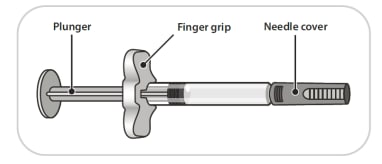
Important information you need to know before injecting Yusimry
Do not use the prefilled syringe and call your healthcare provider or pharmacist if:
- Liquid is cloudy, discolored, or has flakes or particles in it
- Expiration date has passed
- Liquid has been frozen (even if thawed) or left in direct sunlight
- The prefilled syringe has been dropped or crushed.
Keep the needle cover on until right before your injection.
How should I store Yusimry?
- Store Yusimry in the refrigerator between 36°F to 46°F (2°C to 8°C).
- Store Yusimry in the original carton until use to protect it from light.
- Do not freeze.
- Refrigerated Yusimry may be used until the expiration date printed on the Yusimry carton, dose tray or prefilled syringe.
- If needed, for example when you are traveling, you may also store Yusimry at room temperature up to 77°F (25°C) for up to 14 days.
- Throw away Yusimry if it has been kept at room temperature and not used within 14 days
- Record the date you first remove Yusimry from the refrigerator in the spaces provided on the carton and dose tray.
- Do not store Yusimry in extreme heat or cold.
Keep Yusimry, injection supplies, and all other medicines out of reach of children.
Read instructions on all pages before using the Yusimry single-dose prefilled syringe
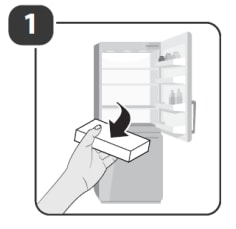
Take Yusimry out of the refrigerator.
- Leave Yusimry at room temperature for 15 to 30 minutes before injecting.
- Do not remove the needle cover while allowing Yusimry to reach room temperature.
- Do not warm Yusimry in any other way. For example, do not warm it in a microwave or in hot water.
- Do not use the prefilled syringe if liquid has been frozen (even if thawed).
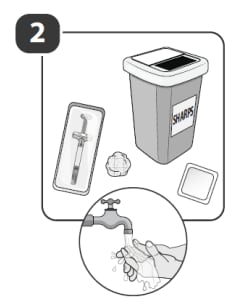
Check expiration date on the prefilled syringe label. Do not use the prefilled syringe if expiration date has passed.
Place the following on a clean, flat surface:
- 1 single-dose prefilled syringe
- 1 alcohol swab (not included)
- 1 cotton ball or gauze pad (not included)
- Puncture-resistant sharps disposal container (not included). See Step 8 at the end of this Instructions for Use for instructions on how to throw away (dispose of) your prefilled syringe.
Wash and dry your hands.
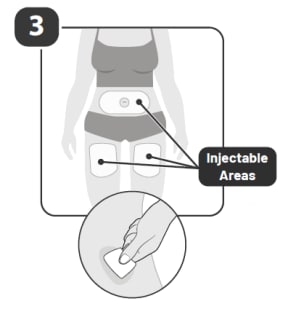
Choose an injection site:
- On the front of your thighs or,
- Your abdomen (belly) at least 2 inches from your navel (belly button).
- Different from your last injection site.
Wipe the injection site in a circular motion with the alcohol swab.
- Do not inject through clothes.
- Do not inject into skin that is sore, bruised, red, hard, scarred, has stretch marks, or areas with psoriasis plaques.
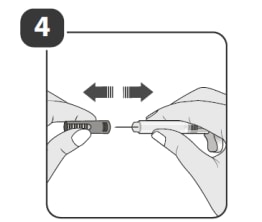
Hold the prefilled syringe in one hand.
Gently pull the needle cover straight off with the other hand.
- Throw the needle cover away.
- Do not touch the needle with your fingers or let the needle touch anything.
- You do not need to remove the air bubble from the syringe.
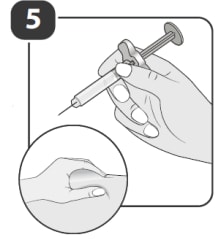
Hold the body of the prefilled syringe in one hand between the thumb and index fingers. Hold the prefilled syringe in your hand like a pencil.
Do not pull back on the plunger at any time.
Gently squeeze the area of cleaned skin at your injection site with your other hand. Hold the skin firmly.
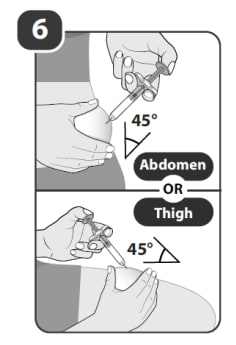
Insert the needle into the skin at about a 45 degree angle using a quick, dart-like motion.
- After the needle is in, let go of the skin.
Slowly push the plunger all the way in until all of the liquid is injected and the prefilled syringe is empty.
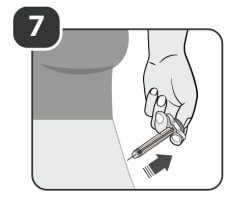
When the injection is completed, slowly pull the needle out of the skin while keeping the prefilled syringe at the same angle.
After completing the injection, place a cotton ball or gauze pad on the skin of the injection site.
- Do not rub.
- Slight bleeding at the injection site is normal.
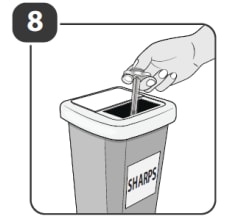
How should I dispose of the used Yusimry prefilled syringe?
- Put your used syringes in a FDAcleared sharps disposal container right away after use. Do not throw away (dispose of) syringes in the household trash.
- If you do not have a FDA-cleared sharps disposal container, you may use a household container that is:
- made of a heavy-duty plastic,
- can be closed with a tight-fitting, puncture-resistant lid, without sharps being able to come out,
- upright and stable during use,
- leak-resistant, and
- properly labeled to warn of hazardous waste inside the container.
- When your sharps disposal container is almost full, you will need to follow your community guidelines for the right way to dispose of your sharps disposal container. There may be state or local laws about how you should throw away used syringes. For more information about safe sharps disposal, and for specific information about sharps disposal in the state that you live in, go to the FDA’s website at: http://www.fda.gov/safesharpsdisposal.
- Do not dispose of your used sharps disposal container in your household trash unless your community guidelines permit this. Do not recycle your used sharps disposal container.
The needle cover, alcohol swab, cotton ball or gauze pad, dose tray, and packaging may be placed in your household trash.
Questions about using the Yusimry single-dose prefilled syringe
What if I have not received in-person training from a healthcare provider?
- Call your healthcare provider or 1-800-483-3692 or visit www.Yusimry.com if you need help.
Always keep the prefilled syringe and the sharps disposal container out of the reach of children.

- Keep a record of the dates and locations of your injections.
- To help you remember when to take Yusimry, mark your calendar ahead of time.
